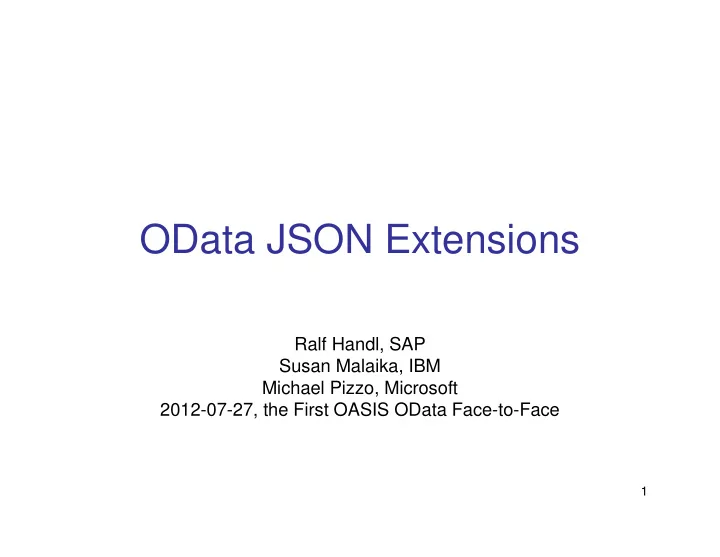

OData JSON Extensions Ralf Handl, SAP Susan Malaika, IBM Michael Pizzo, Microsoft 2012-07-27, the First OASIS OData Face-to-Face 1
JSON Background • JSON is widely used as a popular interchange format. • JSON databases have emerged with native support for JSON documents such PostGres, CouchDB, and MongoDB. • Attractions of JSON databases include: – Schema-less processing where developers do not need to consult database administrators when data structures change. – Data structure evolution without altering services data model • Example: define a resume as a document, rather than shredding the resume into structured entity properties • JSON databases allow JSON collections to be defined implicitly (at first JSON insert) or explicitly, e.g. as in PostGres to create a table with a column of JSON data type: • Common use cases for JSON databases include: – Logging the exchanged JSON for audit purposes – Examining and querying stored JSON – Updating stored JSON – Altering subsequent user experiences in accordance with what was learnt from earlier user exchanges from the stored JSON 2
JSON Requirements • An OData Stream data type may be annotated to represent a JSON data type • JSON properties may be returned separately from non- JSON properties • Entities may be filtered based on the content of their JSON properties • JSON values that have been derived from JSON properties may be retrieved • Scalar values that have been derived from JSON properties may be retrieved • Find operations may be applied to JSON properties • The values of JSON properties may be updated 3
Annotation Example for JSON <Schema xmlns="http://schemas.microsoft.com/ado/2008/09/edm" Namespace="Personnel"> <EntityContainer Name="MyCompany"> <EntitySet Name="Employees" EntityType="Employee"/> </EntityContainer> <EntityType Name="Employee"> <Key> <PropertyRef Name="empid"/> </Key> <Property Name="empid" Type="Edm.Int32" Nullable="false"/> <Property Name="lastname" Type="Edm.String" Nullable="false" MaxLength="30" FixedLength="false" Unicode="true"/> <Property Name="resume" Type="Edm.Stream" Nullable="true" MaxLength="Max" FixedLength="false"> <ValueAnnotation Name="OData.ContentType" value="application/json"/> </Property> </EntityType> </Schema> 4
Observations on the JSON Examples • We have avoided using curly braces {} in the OData URLs. Instead we use parentheses () • We use a slash / instead of the more usual dot . in JavaScript, to navigate along the JSON structure, because OData uses dot for namespaces • Functions that return results associated with OData EDM data types have been used, e.g., find_string instead of find, to ensure that function return data type is known 5
Example : JSON Query • To retrieve only those employees that have “Pizzo” as reference.lastname in their resume, one might submit: – http://www.example.com/mycompany/Employees?$filt er=resume/JSON.find_string(‘(reference/lastname= " P izzo " )’) • To retrieve resumes, ordering the result based on the state in which they live, where that state is located in their resume, one might submit: – http://www.example.com/mycompany/Employees/res ume?$orderby=resume/JSON.find_string(‘()’,’(state:1) ’) 6
Example: JSON Update • To replace an old resume with a new resume for a specific employee, one might submit: PUT /resume166549.json HTTP/1.1 Host: host Content-Type: application/json DataServiceVersion: 1.0 MaxDataServiceVersion: 3.0 If-Match: ...Etag... Content-Length: #### resume : { ssn:1234, lastname:"Handl", address:{zipcode:"10022", street:"ABC st" experience:excellent, } 7
Design Principles • The design principles of OData extensions are to: – Ensure extensions do not violate the core semantics of OData – Avoid defining different representations for common concepts across extensions – Ensure independent extensions compose well – Ensure clients can ignore extended functionality and still query and consume data correctly 8
Technical Directions • The following are some technical directions for the JSON extension to OData: – An OData vocabulary for JSON shall be defined. – An annotation from a common vocabulary defining the JSON content type should be applied to a Stream property that represents JSON documents. – The JSON vocabulary will define functions that can be applied to JSON properties. – These functions will be based on common functions found in native JSON databases 9
Open Questions, Issues and Work Items • The JSON annotation may contain additional properties describing the JSON document, e.g., one or more JSON schemas • Support may be provided for updating only a portion of a JSON property • OData could be extended to allow expressions in the $select query option, allowing derived values to be returned along with the properties of an entity • OData could be extended with an operator that returns the content of a Stream as either a String or Binary value • The OData.ContentType value annotation could be defined to allow multiple content types as its value • An alternative approach for the use of JSON in OData is to map JSON to dynamic properties of open data types. The rationale for choosing a document oriented approach is to treat the JSON as a single unit • This paper describes functions that operate on JSON encoded documents. These functions are applicable to other encodings such as ATOM, and the technical committee could consider a set of common functions across different encodings 10
Useful Links [1] JSON http://en.wikipedia.org/wiki/JSON [2] ECMAScript http://www.ecma-international.org/publications/files/ECMA-ST/Ecma- 262.pdf [3] IETF RFC 4627 http://www.ietf.org/rfc/rfc4627.txt [4] PostGres http://www.postgresql.org/docs/devel/static/datatype-json.html [5] Apache CouchDB http://en.wikipedia.org/wiki/CouchDB [6] MongoDB http://en.wikipedia.org/wiki/MongoDB [7] Document databases http://en.wikipedia.org/wiki/Document-oriented_database [8] NoSQL databases http://en.wikipedia.org/wiki/NoSQL [9] SQL/XML http://en.wikipedia.org/wiki/SQL/XML [10] XQilla: XQuery extensions for JSON http://xqilla.sourceforge.net/ExtensionFunctions [11] JSONiq : XQuery extension for JSON http://www.w3.org/2011/10/integrationworkshop/p/Documentation-0.1-JSONiq-Article- en-US.pdf [12] Marklogic : http://en.wikipedia.org/wiki/MarkLogic [13] JSON Schema: http://tools.ietf.org/html/draft-zyp-json-schema-03 [14] OData Extension for JSON Data -A Directional White Paper https://www.oasis- open.org/committees/download.php/46085/ODataExtensionforJSONDatav1.0.pdf 11
Recommend
More recommend